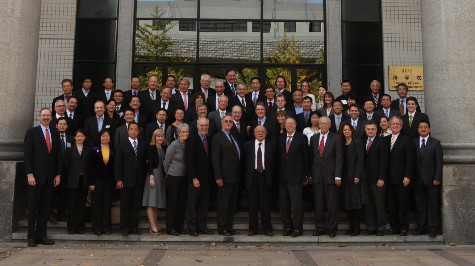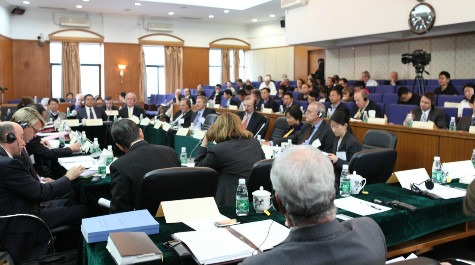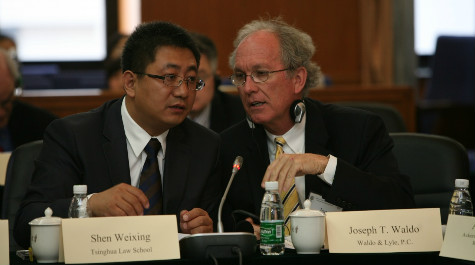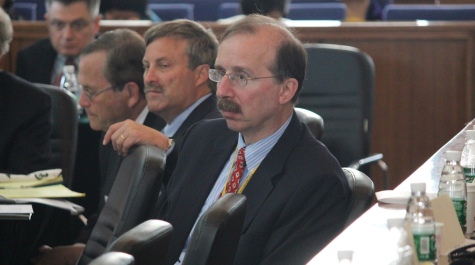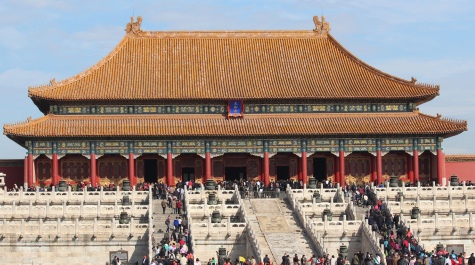William & Mary Law School Successfully Concludes First International Conference in Beijing
The first international conference hosted by William & Mary Law School's Property Rights Project came to its successful conclusion Oct. 15 at Tsinghua University in Beijing, China. Scholars, jurists, and practitioners from the United States and China gathered at the Project's Eighth Annual Brigham-Kanner Property Rights Conference to discuss the evolution of property rights on a global scale.
“This was the most exciting conference I have ever attended,” said Lynda Butler, Chancellor Professor of Law and Director of the Property Rights Project. “My goal in developing the conference program was to answer the question, ‘Why China?’ in a way that sparked a contagious intellectual vibrancy. We structured panel topics to bring out the similarities and differences between the property systems of the world’s two largest economies.”
“This was truly a special gathering,” added William & Mary Law School Dean Davison M. Douglas. “The relationships begun during this conference, and the friendships forged over these three days, have laid the groundwork for many more years of collaboration and exchange of ideas.”
A highlight of the conference was the presentation of the Brigham-Kanner Property Rights Prize to retired Supreme Court Justice Sandra Day O’Connor. O’Connor, who became Chancellor of the College of William & Mary following her retirement from the judiciary in 2006, appeared via video to accept the prize and offered a lively speech about the intersection of American and Chinese law on property rights.
In her remarks, O’Connor invoked the storied history of property rights in U.S. law. From Thomas Jefferson and other founders to modern American society today, the United States has held a special solicitude for property rights. O’Connor also recognized the growing protection of property rights in China, noting a 2004 provision in China’s Constitution that requires compensation for governmental takings of private property. The implementation of this new constitutional provision, she argued, has helped spur and stabilize China’s economic system. “I hope that the mutual understanding begun at this conference will continue to thrive for many years to come,” she concluded.
Previous Brigham-Kanner Property Rights Prize recipients also traveled to Beijing, and participated in a number of panels throughout the conference. The panelists included Richard A. Epstein of the University of Chicago Law School and New York University School of Law, Robert C. Ellickson of Yale Law School, James W. Ely, Jr. of Vanderbilt Law School, Frank I. Michelman of Harvard Law School, and Carol M. Rose of the University of Arizona College of Law and Yale Law School.
The presentations of these panelists and others will be included in the inaugural Brigham-Kanner Property Rights Conference Journal, which will be published annually in both electronic and print format. Through the Conference Journal, the Property Rights Project will ensure that the proceedings of the Brigham-Kanner Property Rights Conference are preserved and made available for all interested parties.
 Joe Waldo ‘78 of Waldo & Lyle P.C., an eminent domain law firm in Norfolk, VA, and a member of the Conference Planning Committee, reflected on the successes and future of the Conference. “The Brigham-Kanner Property Rights Conference brought together scholars and practitioners from the world’s two greatest economies in an exchange of theory and practice on the important issue of property rights,” he said. “The fact that this international conference took place in Beijing is remarkable even more so because there was a frank and open discussion on the principles impacting the right to private property, including human dignity and liberty as well as economic achievement. I believe this international conference placed a global perspective on the important role property rights play in our society and in one’s individual liberty.”
Joe Waldo ‘78 of Waldo & Lyle P.C., an eminent domain law firm in Norfolk, VA, and a member of the Conference Planning Committee, reflected on the successes and future of the Conference. “The Brigham-Kanner Property Rights Conference brought together scholars and practitioners from the world’s two greatest economies in an exchange of theory and practice on the important issue of property rights,” he said. “The fact that this international conference took place in Beijing is remarkable even more so because there was a frank and open discussion on the principles impacting the right to private property, including human dignity and liberty as well as economic achievement. I believe this international conference placed a global perspective on the important role property rights play in our society and in one’s individual liberty.”
